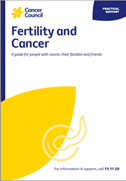- Home
- About Cancer
- Managing side effects
- Fertility and cancer
- Treatment side effects and fertility
Treatment side effects and fertility
This section provides an overview of how cancer treatments may affect fertility. The most common treatments for cancer are chemotherapy, radiation therapy, surgery and hormone therapy.
Other treatments include immunotherapy and targeted therapy. Learning that cancer treatment may affect your fertility can be distressing. If you need support at this time, call Cancer Council 13 11 20.
Learn more about:
- Chemotherapy
- Radiation therapy
- Surgery
- Hormone therapy
- Other treatments
- Specific challenges after treatment
- Tips for managing fertility and treatment
Avoiding pregnancy during treatment
Some cancer treatments, such as chemotherapy, radiation therapy, immunotherapy or targeted therapy, can harm an unborn baby or cause birth defects.
| During treatment | Even if your periods stop during cancer treatment, you might still be fertile. You will need to use some form of contraception to avoid pregnancy while having treatment. |
| After treatment | Your treatment team and fertility specialists may also advise you to wait between 6 months and 2 years before starting fertility treatment or trying to conceive naturally. How long you have to wait will depend on the type of cancer treatment you’ve had. |
| Using contraception | Your team may also advise you to use barrier contraception (such as a condom, female condom, dental dam or diaphragm), “the pill” or hormone implants, or non-hormone-based contraception (IUD) for a short time after each treatment, even if there is no risk of pregnancy. Barrier contraception will also protect your partner from any chemotherapy drugs that may be present in your body fluids. |
Read personal stories from women who have been diagnosed with cancer while pregnant
→ READ MORE: The impact of chemotherapy on fertility
Podcast: Sex and Cancer
Listen to more of our podcast for people affected by cancer
More resources
Prof Martha Hickey, Professor of Obstetrics and Gynaecology, The University of Melbourne and Director, Gynaecology Research Centre, The Royal Women’s Hospital, VIC; Dr Sally Baron-Hay, Medical Oncologist, Royal North Shore Hospital and Northern Cancer Institute, NSW; Anita Cox, Cancer Nurse Specialist and Youth Cancer Clinical Nurse Consultant, Gold Coast University Hospital, QLD; Kate Cox, McGrath Breast Health Nurse Consultant, Gawler/ Barossa Region, SA; Jade Harkin, Consumer; A/Prof Yasmin Jayasinghe, Director Oncofertility Program, The Royal Children’s Hospital, Chair, Australian New Zealand Consortium in Paediatric and Adolescent Oncofertility, Senior Research Fellow, The Royal Women’s Hospital and The University Of Melbourne, VIC; Melissa Jones, Nurse Consultant, Youth Cancer Service SA/NT, Royal Adelaide Hospital, SA; Dr Shanna Logan, Clinical Psychologist, The Hummingbird Centre, Newcastle West, NSW; Stephen Page, Family Law Accredited Specialist and Director, Page Provan, QLD; Dr Michelle Peate, Program Leader, Psychosocial Health and Wellbeing Research (emPoWeR) Unit, Department of Obstetrics and Gynaecology, The Royal Women’s Hospital and The University of Melbourne, VIC; Pampa Ray, Consumer; Prof Jane Ussher, Chair, Women’s Health Psychology, and Chief Investigator, Out with Cancer study, Western Sydney University, NSW; Prof Beverley Vollenhoven AM, Carl Wood Chair, Department of Obstetrics and Gynaecology, Monash University and Director, Gynaecology and Research, Women’s and Newborn, Monash Health and Monash IVF, VIC; Lesley Woods, 13 11 20 Consultant, Cancer Council WA.
View the Cancer Council NSW editorial policy.
View all publications or call 13 11 20 for free printed copies.

